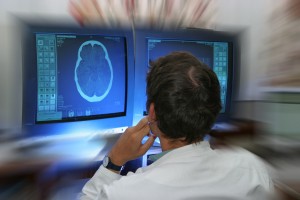Digital Health
There is currently a global boom in so-called Digital Health solutions, also in Austria. In 2017, software for medicine, telemedicine and e-health played by far the most important role in the business acitivities of the Austrian dedicated medical device companies. More than a third identified themselves as having skills and products in this category. This figure is on the rise: Three years earlier, it had been 29%. Not suprisingly, half of the 35 newcomers in the field belong to this category. The companies’ products include software solutions that enable clinical personnel to monitor real-time localizations of patients, establish an emergency call system and work as a protection system for disoriented patients.

Data plays a key role in diabetes management. It helps healthcare teams adjust therapy. More importantly, data helps the person living with diabetes better understand and manage everyday life. Collecting and managing diabetes data, however, is usually cumbersome and time consuming. The mySugr app simplifies life with diabetes, making it quick and easy to collect relevant therapy data in one place through a growing number of connected devices, integrations, and manual entry. The mySugr app is available in 52 countries and 13 languages. The company mySugr was founded in 2012 in Vienna. Today, nearly around 50 employees are striving to make life better for people suffering from diabetes. In June 2017 mySugr was acquired by Roche.
According to the WHO around 60 million people worldwide suffer from bipolar affective disorder, a condition better known as manic-depressive illness. These people repeatedly experience phases of depression and mania that often entail serious social and economic consequences. meemo-tec’s smartphone app supports people suffering from bipolar disorder in their daily lives and connects them with persons they trust. Using intelligent algorithms, the programme is designed to detect shifts from healthy daily routines towards behaviours favouring the disorder and to counteract this development. Users document their daily activities and assess their mood with UP!. The app also automatically records physical activities, work-life-balance and sleeping habits, enabling users to better understand links between their day-to-day lives and depression and/or mania. Moreover, users can generate health reports covering several weeks, which give physicians and therapists a better overview of the course of the disease and help them improve their therapies.
The Viennese company ImageBiopsy Lab is developing novel software solutions for analysing X rays to improve the diagnosis of osteoarthritis, the most frequent degenerative joint disease worldwide. Based on deep learning approaches, the ImageBiopsy solution analyses X-rays in a standardised and objective manner within a few seconds. The software is armed with a learning algorithm trained on a database comprising 150,000 radiological images. It knows what a healthy knee looks like and can automatically identify different stages of the disease with the help of these images. The system marks abnormalities and suggests a diagnosis. n Europe, 70 million people currently suffer from osteoarthritis. In view of the demographic change, this number is estimated to exceed 100 million by 2040. The self-learning software for analysing radiological images developed by ImageBiopsy Lab is designed to meet the rising demand.
Contextflow is developing machine learning technology for large medical image data. Working closely together with supporting radiologists, they now have their deep learning-based technology ready to support them in their daily routine. Instead of spending time on frustrating search via multiple web sources, books and literature, the contextflow search engine puts relevant information at their disposal in the blink of an eye.
is developing machine learning technology for large medical image data. Working closely together with supporting radiologists, they now have their deep learning-based technology ready to support them in their daily routine. Instead of spending time on frustrating search via multiple web sources, books and literature, the contextflow search engine puts relevant information at their disposal in the blink of an eye.
In microsurgery, the operating microscope is the surgeon’s most important tool. The currently used technology is based on a concept developed in the late 1950s and has never been substantially refined. BHS Technologies is building an operating microscope that ergonomically adapts to the surgeon. The first pilot tests found work ergonomics and operating procedures to be substantially improved. A functional surgical microscope built by BHS Technologies from standard components and was tested in several hospitals in collaboration with the users. The feedback was overwhelming. BHS Technologies plans to bring the first microscopes to the market by mid 2020.
Listening to the heart is a highly subjective examination, which is particularly difficult in neonatology due to the very high heart rates and restless behaviour of newborns. CSD Labs is developing eMurmur®, a medical software to support physicians in the auscultation of the heart. The use of innovative algorithms developed and validated on the basis of clinical data makes the software a technological front runner. eMurmur® is non-invasive, offers diagnostic suggestions for cardiac defects within a few seconds and facilitates the comprehensive and reliable electronic documentation of heart defect screenings. Besides the often suboptimal quality of clinical data, the complexity and variability of heart sounds and heart noises constitute major challenges in computer-assisted auscultation. The algorithms developed by CSD Labs® are the first to permit the fully-automated extraction of physiologically meaningful parameters from these complex signals.
